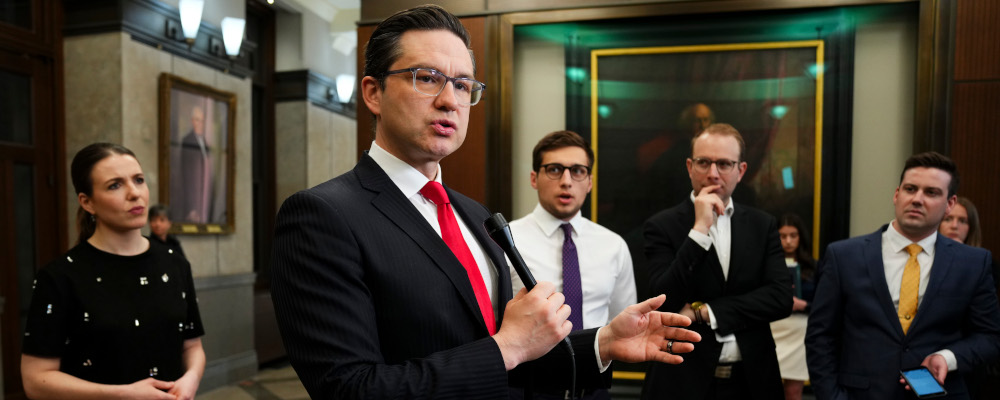“Are you serious?” a wide-eyed, Pierre Poilievre asked the reporter quizzing him about crime and bail reform last week.
Poilievre and the Conservative Party MPs behind him seemed genuinely shocked at the premise of the question. It’s a familiar feeling for many of us. Increasingly, regular people are left shaking their heads, baffled by the latest term they’re expected to use, premise they’re supposed to understand, or public policy trend they’re supposed to accept. It’s not that they don’t get it. It’s that it defies common sense.
In that moment, Poilievre was channeling our collective befuddlement, as the journalist clumsily tried to suggest that keeping repeat, violent criminals behind bars would somehow not prevent more crimes from occurring. The most generous interpretation of the journalist’s line of question is that he was trying to suggest there are root causes that initiate a first-time criminal’s descent into violence. But even if that were his intent (and given his follow-up questions, it seems unlikely), the fact remains that when criminals are in jail, they can’t commit more crimes…because they’re in jail.
Indeed, the data is so compelling that even the Trudeau government is now carrying out some much-needed reform. And yet, the reporter felt the need to carry water for an ideological approach that defies all logic, either because he genuinely believes loose bail policy works, despite the evidence to the contrary, or, more likely, because he’s captured by a new, progressive worldview increasingly dominant in Canadian institutions, including the Parliamentary press gallery, that is completely out of touch with reality.
It’s hard to define the new bias of elite liberal institutions. Calling it wokeness feels overdone, and maybe a bit cheap. But a week before Poilievre shook his head at the reporter’s ridiculous question, Canada’s prime minister opted to drape himself and his party in the moniker, so it seems as useful a descriptor as any. Whatever it is, you know it when you see it. A contradictory blend of liberal individualism and critical theory, new progressivism puts language before action, identity before community, and future before history. It cancels people, it virtue signals, and it experiments with radical public policy. More importantly, it can be alienating. Woke culture tends to champion what Rob Henderson calls luxury beliefs, views that are alienating in their substance (you’re unlikely to be able to justify defunding the police if you live in a crime-filled neighbourhood), and their language (comprised of a dictionary of new terms that seem to change on a weekly basis).
But railing against wokeness will only get Canadians who oppose it so far. The culture war dynamic has become so predictable as to be boring, and the fact that it often happens online means that regular Canadians, the mainstream normies who will make up most voters in the next election, will need more than just anti-woke railing to capture their attention. Poilievre has landed on exactly the right frame for communicating a positive, alternative worldview, one that doesn’t just oppose wokeness, but that champions good old-fashioned common sense.
Poilievre mastered the anti-woke attack during last year’s Conservative Party leadership race. He called out cancel culture on campus, exposed the hypocrisy of Trudeau’s virtue signalling on climate change, and targeted the government’s out-of-control spending on pet issues while inflation raged. Each attack was accompanied by a detailed alternative policy proposal—free speech protections on campus, approving Canadian oil and gas projects, a pay-as-you-go spending commitment, and many, many more. But the effect was to draw a contrast, to enhance the negative, and to show voters what Poilievre opposed—and for good reason, he was auditioning to be leader of the opposition. Now, as the next general election nears, Poilievre’s challenge is to bring a stronger, positive narrative framework to his policies, and he’s starting to do just that.

In response to Trudeau’s Liberal convention appeal, Poilievre posted a video in his signature, on-the-go selfie style, juxtaposing Trudeau’s woke policies with his own common-sense approach. Where Trudeau would ban hunting rifles, attacking innocent farmers and sport shooters, Poilievre would bring in bail reform, targeting repeat violent criminals. Where Trudeau would support the so-called “safe supply” of harmful addictive drugs, Poilievre would prioritize treatment. Where Trudeau would raise the carbon tax, Poilievre would cancel it, and so on.
Poilievre’s focus on framing his commitments through the lens of common sense isn’t entirely new. He’s railed against the gatekeepers and spoken passionately about the common people for years, peppering his speeches with appeals to the many over the few and revealing a personal vision of a Parliament that serves the people, instead of the other way around. But it wasn’t until recently that Poilievre combined the battle against wokeism with the case for common sense policies for common people, and by doing so, Poilievre takes his online culture war credibility and gives it mainstream, in-real-life appeal.
Poilievre’s common-sense frame does what the left has done so effectively over the last decade—it wrenches open the Overton window on his side of the ideological spectrum. By asserting that his views, while substantive and principled, are common sense, he allies himself with mainstream public opinion. And as the Liberals overplay their progressive hand, hoping no one will notice their experimental policies are failing, his mainstream language resonates. The reason regular people feel so befuddled by wokeism, the reason we all nod our heads when Poilievre asks “Are you serious?” is because, to use a common expression, people don’t like to be urinated on and then told it’s raining. Until recently, dominant voices in the media and the halls of power have successfully made common views out to be radical and their own views out to be reasonable.
Within this frame, conservatives seem like reactionaries. But as liberal elites have become more captured by woke ideology, their values have increasingly become inaccessible to everyday Canadians. By championing bourgeois virtues, speaking to the common people, and appealing to common sense, Poilievre is rejecting that frame and putting himself and his party smack dab in the regular, boring, mainstream centre of Canadian public opinion. And that’s a winning strategy.
Recommended for You

‘A celebration of the spirit of Alberta’: Ryan Hastman on the political, economic, and cultural importance of the Calgary Stampede

‘Can we actually be an independent country?’: Michael Ignatieff on the 60th anniversary of Lament for a Nation

Fred DeLorey: Why the NDP may be in even bigger trouble than we think

Michael Geist: Children accessing porn is a problem, but government-approved age verification technologies are not the answer




